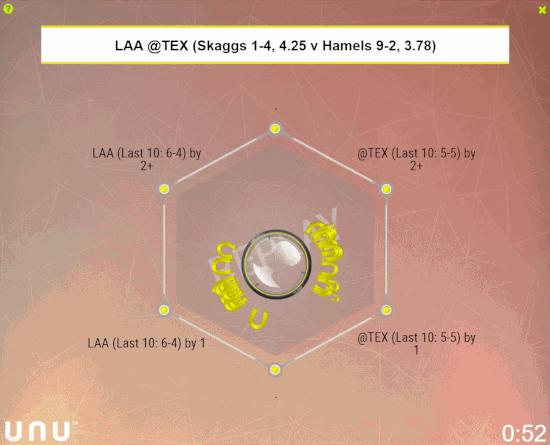One of the foundational elements of swarm intelligence is how it creates an opportunity for consensus through compromise. The individuals who make up a swarm work together to find areas where they can agree and use those areas of commonality to arrive at smarter decisions than they would potentially make as individuals. Sometimes converging on a unified solution is difficult, though.
Every week researchers ask swarms questions about fairly serious subjects involving current events and cultural trends. Of all these tough questions that researchers at Unanimous A.I. ask on our Swarm AI platform, it was something as trivial as the winner of a baseball game on Friday that caused one of the most inconclusive results a swarm has provided. In Friday’s MLB post, we highlighted the swarm’s refusal to recommend a wager, noting “the $0 confidence they then expressed on that game fits perfectly with the shaky consensus and lack of cohesion the swarm showed in making the pick.”

Members of this swarm were obviously of very mixed opinion here, and with reason. The Angels have been the hotter team of late, but the Rangers were playing at home, with a better starting pitcher in Cole Hamels on the mound. It ended up with a 54% brainpower score, the single lowest we’ve gotten in an MLB swarm this year. The brainpower stat is a measure of how rapidly a swarm forms a consensus. It provides one way of quantifying how confident the swarm is with its answer.
When we ask about baseball games, we have other measures of confidence, too. After the swarm picks a winner in each game, they’re asked how much they’d hypothetically wager on a scale of $0 to $100 on the outcome they’ve just predicted. Here’s how they answered to that split swarm on the Angels and Rangers game Friday.

In the end, it seems as if the swarm was predicting a game too close to call more than anything else. So how did the actual contest play out? On Friday night at the end of six innings, the Rangers seemed to have things well in hand with a 9-4 lead. The Angels, however, are fighting Texas for the last American League wildcard spot in the playoffs and clawed back into the game with three runs in the seventh and two more in the top of the eighth to knot the score at 9-9. The Rangers eventually won the contest 10-9 on a walk, a stolen base, a throwing error, and a wild pitch. Between the two clubs, the managers used 15 pitchers in a regulation length game. The contest took over four and a half hours to decide, making it the third-longest nine-inning baseball game in major league history.
In retrospect, the group’s troubled, zero-confidence decision was entirely justified and completely reflected in the way this game played out. For Unanimous A. I., this is one of the most exciting aspects of the emergent artificial intelligence that comes from swarms. Very often, swarms on UNU demonstrate not only an ability to successfully answer questions, but also an awareness of questions with answers that may be too difficult to be predicted confidently. That awareness should serve our sports swarms well as they get busy picking results of NFL and English Premier League games next week.

Unanimous AI runs predictive swarms every week for MLB, the NFL and more. Want those picks delivered to your inbox?
The news, information, opinion, and recommendations on this website are for education and entertainment only. This information is not intended to violate any local, state, or federal laws, and all persons using this website are solely responsible for complying with the laws of the jurisdictions in which they reside. Unanimous A.I. is not responsible for the accuracy of any predictions made on this website, and does not recommend using the information on this site for wagering. Unanimous A.I. does not intend to encourage or condone gambling in jurisdictions where it is prohibited or by persons who are under 18 years of age.

